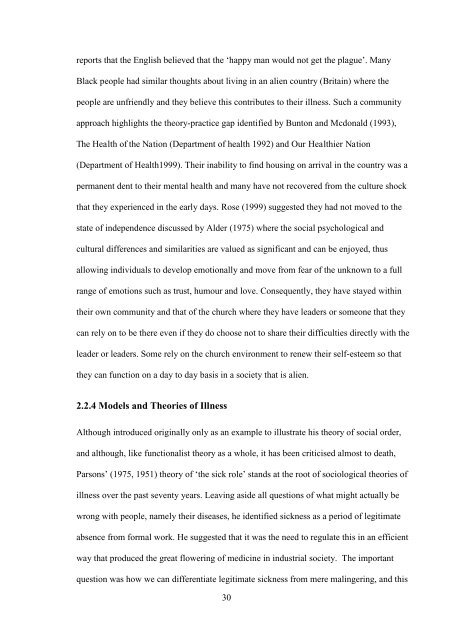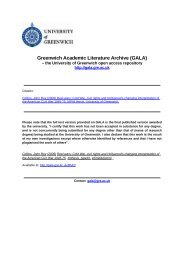- Page 1: Greenwich Academic Literature Archi
- Page 4 and 5: AcknowledgementsI extend much grati
- Page 6 and 7: Chapter 3: Methodology 633.1 Introd
- Page 8 and 9: 7.3 Prayer as Health Seeking Behavi
- Page 10 and 11: CHAPTER ONEINTRODUCTION AND CONTEXT
- Page 12 and 13: healing, bricolage and the use of s
- Page 14 and 15: To remedy these gaps in the discour
- Page 16 and 17: do with me‟ so she sent me to sch
- Page 18 and 19: Interestingly, after 30 years of pr
- Page 20 and 21: listening to a group of people that
- Page 22 and 23: that I felt within the Black majori
- Page 24: Chapter 3 describes the methodology
- Page 27: espondents‟ perception of sufferi
- Page 30 and 31: CHAPTER TWOLITERATURE REVIEW2.1 Int
- Page 32 and 33: themes, it became necessary to revi
- Page 34 and 35: suggests a combined approach where
- Page 36 and 37: and healing as a kind of self-impro
- Page 40 and 41: question of legitimacy may help us
- Page 42 and 43: Goffman (1995), although he does no
- Page 44 and 45: for being sick and are therefore re
- Page 46 and 47: ethnographies of religious groups s
- Page 48 and 49: The concept of healing and spiritua
- Page 50 and 51: approaches to health, but over how
- Page 52 and 53: argued that the concept of culture
- Page 54 and 55: Popular advocates of spiritual heal
- Page 56 and 57: Ward (1992). Like the physical heal
- Page 58 and 59: show how the spiritual can easily b
- Page 60 and 61: condition that they are praying abo
- Page 62 and 63: keep it in mind when looking at the
- Page 64 and 65: there may be more room for spiritua
- Page 66 and 67: I had a good sleep and awoke feelin
- Page 68 and 69: with their cultural identity and th
- Page 70 and 71: 2.5 ConclusionThis literature revie
- Page 72 and 73: CHAPTER THREEMETHODOLOGY3.1 Introdu
- Page 74 and 75: only with further theological study
- Page 76 and 77: wished to have baptism in the way J
- Page 78 and 79: Pentecostal churches and even some
- Page 80 and 81: of different experiences and attitu
- Page 82 and 83: the perceptions of those seeking sp
- Page 84 and 85: activities other than that of prayi
- Page 86 and 87: services more than I wanted to be a
- Page 88 and 89:
principles to judge the validity an
- Page 90 and 91:
discover or make transparent organi
- Page 92 and 93:
3.7.1 ConsentWithin the ethical app
- Page 94 and 95:
It was extremely difficult to expla
- Page 96 and 97:
does not make the position equitabl
- Page 98 and 99:
Table 1Demographic Details of Respo
- Page 100 and 101:
stages of analysis can in fact be a
- Page 102 and 103:
CHAPTER FOURTHE PEOPLE AND THEIR BA
- Page 104 and 105:
Both denominations observed believe
- Page 106 and 107:
those who believe they have a heali
- Page 108 and 109:
and orally transmitted for COGIC. T
- Page 110 and 111:
American sociologists (Ehrenreich 1
- Page 112 and 113:
gatherings which dealt with schisma
- Page 114 and 115:
e expelled), in which case it would
- Page 116 and 117:
formal regulation as individual spi
- Page 118 and 119:
American, was the presiding Bishop
- Page 120 and 121:
MacRobert (1988) and Beckford (2006
- Page 122 and 123:
The researcher has previously discu
- Page 124 and 125:
slavery. Groups and subgroups estab
- Page 126 and 127:
According to Gottwald (1989) libera
- Page 128 and 129:
year to year.4.8 History of COGIC i
- Page 130 and 131:
Table 2 Organisational hierarchy of
- Page 132 and 133:
services are conducted. However, th
- Page 134 and 135:
(the list of pre-planned bible read
- Page 136 and 137:
We acknowledge the gifts and answer
- Page 138 and 139:
local church formulates their own g
- Page 140 and 141:
ealized that the Presbyterian and t
- Page 142 and 143:
Local URC activitiesWeeklySunday: 1
- Page 144 and 145:
The second minister went forward an
- Page 146 and 147:
Prayers of Intercession (healing se
- Page 148 and 149:
the dress code is culturally differ
- Page 150 and 151:
people to function in the capacity
- Page 152 and 153:
details. They have many short cours
- Page 154 and 155:
each other. Folk medicine is usuall
- Page 156 and 157:
attempt to treat the person. This h
- Page 158 and 159:
CHAPTER FIVETHE HOLY SPIRIT, POWER
- Page 160 and 161:
5.2 The Church as an OrganisationTh
- Page 162 and 163:
The word „pastor‟ is mentioned
- Page 164 and 165:
and cultural patterns of how author
- Page 166 and 167:
congregation (URC and COGIC) unders
- Page 168 and 169:
and his wife acting as equal partne
- Page 170 and 171:
Pentecostal churches the appearance
- Page 172 and 173:
character and the purpose of God to
- Page 174 and 175:
man) occurring in Acts 2 were inten
- Page 176 and 177:
personal experience. He then wrote
- Page 178 and 179:
In the above extract the respondent
- Page 180 and 181:
in Gooch‟s view that nurses do no
- Page 182 and 183:
work, a low level of academic study
- Page 184 and 185:
leaders in the kingdom. Winston is
- Page 186 and 187:
The church as an organization and t
- Page 188 and 189:
function at a high emotional intell
- Page 190 and 191:
For example, when praying for cance
- Page 192 and 193:
healer and for the church as an org
- Page 194 and 195:
and pain (sometimes used interchang
- Page 196 and 197:
of curing indicates a narrow focus
- Page 198 and 199:
esponse from respondent 4 (URC) quo
- Page 200 and 201:
selfish as her sister does not do e
- Page 202 and 203:
something was wrong and probably li
- Page 204 and 205:
severity is subjective and can only
- Page 206 and 207:
stated before that faith and suffer
- Page 208 and 209:
Respondent: I argue with my doctors
- Page 210 and 211:
For example the AIDS epidemic has a
- Page 212 and 213:
that allowed her to stay in hospita
- Page 214 and 215:
Suffering and spirituality in the C
- Page 216 and 217:
workplace and difficulties in gaini
- Page 218 and 219:
probably a reflection of Job and he
- Page 220 and 221:
phenomenon. She argued that “the
- Page 222 and 223:
Those living with a partner without
- Page 224 and 225:
concern as to whether she was breat
- Page 226 and 227:
a special „Blacthology‟ (c.f. T
- Page 228 and 229:
to his collection, postulates that
- Page 230 and 231:
Grieving is a psychological process
- Page 232 and 233:
had been told categorically by thei
- Page 234 and 235:
For this young mother the process o
- Page 236 and 237:
CHAPTER SEVENPRAYER AS A HEALING AC
- Page 238 and 239:
other areas where black and ethnic
- Page 240 and 241:
of Rice and Huffstattler is primari
- Page 242 and 243:
praying for health, members of thes
- Page 244 and 245:
There are three effective classical
- Page 246 and 247:
intuition and discernment to channe
- Page 248 and 249:
Respondent 5‟s account continues
- Page 250 and 251:
There is a prayer and healing sessi
- Page 252 and 253:
During the prayers for healing a pe
- Page 254 and 255:
This is also stated in 1 Corinthian
- Page 256 and 257:
Respondent 6 (URC) The chiropractor
- Page 258 and 259:
section 6.3 above, she appears to b
- Page 260 and 261:
the same time. This continued for a
- Page 262 and 263:
The service closed with the ministe
- Page 264 and 265:
young people‟s group, are also ch
- Page 266 and 267:
formulae are said by everyone to ea
- Page 268 and 269:
CHAPTER EIGHTLAYING ON OF HANDS8.1
- Page 270 and 271:
Chapter 2 thus showed that the clin
- Page 272 and 273:
that does not mention this healing
- Page 274 and 275:
(2004) who describes practitioners
- Page 276 and 277:
process of healing that Peter condu
- Page 278 and 279:
The presiding minister invited anot
- Page 280 and 281:
whilst she prayed for some of the
- Page 282 and 283:
During massage therapy the body is
- Page 284 and 285:
her directly‟. Not these words fr
- Page 286 and 287:
the delivery of the sermon. Prayer
- Page 288 and 289:
psychotherapists do not frequently
- Page 290 and 291:
CHAPTER NINEMUSIC FOR WORSHIP AND H
- Page 292 and 293:
Doerkson (2004), the prolific worsh
- Page 294 and 295:
memories and physical responses‟
- Page 296 and 297:
never merely a noise but is the fou
- Page 298 and 299:
mouth and nose and a receptor in th
- Page 300 and 301:
hear. They give shock in rhythmical
- Page 302 and 303:
which may reach the autonomic nervo
- Page 304 and 305:
chooses the music, the choice has t
- Page 306 and 307:
the piano and occasionally the guit
- Page 308 and 309:
The extract below from an observati
- Page 310 and 311:
Respondent 5, the organist in the U
- Page 312 and 313:
When she was allowed to play in a d
- Page 314 and 315:
procedures, there may be some evide
- Page 316 and 317:
drawing together my health professi
- Page 318 and 319:
when I felt empathetic and at „ea
- Page 320 and 321:
Both Tugwell et al (1976) and Rice
- Page 322 and 323:
anti-Christian laws, acknowledges t
- Page 324 and 325:
how contemporary sociologists deali
- Page 326 and 327:
their trust in prayer and in God is
- Page 328 and 329:
are experiencing disease at differe
- Page 330 and 331:
Equally, within NHS health conferen
- Page 332 and 333:
Asher, R., (2002) “Malingering.
- Page 334 and 335:
Coleman, D., (1996) Emotional Intel
- Page 336 and 337:
Fleischman, P. R., (1990) The Heali
- Page 338 and 339:
introductory text, E.Arnold, London
- Page 340 and 341:
Northern Peru” The World of Music
- Page 342 and 343:
pp 166-180.Oppenheimer, M. (2011) A
- Page 344 and 345:
Nursing: Based on Activities of Liv
- Page 346 and 347:
Troeltsch, E., (1931) The Social Te
- Page 348:
291-302.Wright, N., & Smith, S., (1
















